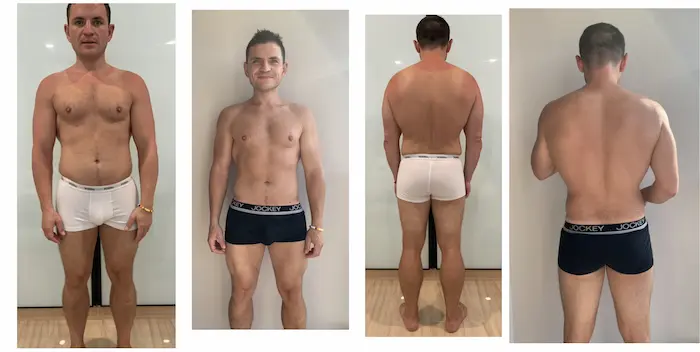
Weight recidivism, or the regain of weight after initial weight loss, is a common occurrence following weight loss interventions, as noted by C. J. de Gara from the University of Alberta. So basically, it’s not that uncommon for people to gain back the weight they’ve lost.
Weight gain after the Optavia diet refers to the phenomenon where individuals regain weight after initially losing it through the Optavia 5 and 1 plan. Yup, even after following a structured plan like Optavia, the pounds can creep back on.
A 2014 study published in the Gastroenterology Research and Practice Journal highlighted the persistent challenge of weight regain in various obesity management strategies. The study found that keeping the weight off is really hard; only a small percentage managed to do it long-term.
The study reported that only 6% of nearly 1,000 subjects were able to maintain a 5% weight loss after 6 years, with approximately one-third of weight loss being regained within a year of non-surgical weight loss interventions. That’s a sobering stat, right? Most people just couldn’t keep the weight off.
When asking, ‘Why am I gaining weight on Optavia?’ the main cause for weight regain after following the Optavia 5 and 1 plan is metabolic adaptation. This means that your body adjusts to the weight loss and starts burning fewer calories, making it easier to gain weight again.
This term refers to the reduction in energy expenditure that occurs after weight loss, as explained by Luca Busetto from the University of Padova. Luca Busetto says your body becomes more efficient, but not in the way you’d want when trying to keep weight off.
To maintain weight after successful weight loss with the Optavia diet, a multidisciplinary approach is necessary. You can’t just focus on eating less and exercising more; it’s more complicated than that.
According to Giovanna Flore and her colleagues from the University of Cagliari, the most effective strategy to prevent weight gain involves more than just reducing energy intake or increasing physical activity; it also includes incorporating behavioral therapy during both the weight loss and weight maintenance phases. Giovanna and her team suggest that mindset and behavior are just as important as diet and exercise.
As a result, questions arise regarding possible causes of weight gain after Optavia, how common is weight gain after Optavia, how to do Optavia on your own without gaining weight, and what to do if you’re not losing weight on Optavia. So yeah, if you’ve been struggling with weight gain after Optavia, you’re definitely not alone in wondering what went wrong.
How common is weight gain after stopping the Optavia 5 and 1 plan?
Weight gain after stopping the Optavia 5 and 1 plan is not uncommon, often due to metabolic adaptation that reduces energy expenditure.
Based on my experience, I lost a ton of weight initially—like, 20 pounds in the first few weeks. I was happy with my initial results. In the beginning, I was super excited that I could eat chocolate bars, and brownies, drink tasty shakes, and still lose weight.
Here’s my photo after the first three weeks on Optavia 5 and 1 plan.

The weight was coming off like crazy.
I lost over 20 lbs in the first few weeks on the 5 and 1 plan. I was able to get into smaller-size jeans and my wife said I look decent without my T-shirt. At this time, I didn’t expect any negative effects of Optavia. But, let me tell you, after a while, I noticed the weight started to creep back on.
What are the common reasons for weight gain on the Optavia plan?
The most common reasons for weight gain on the Optavia plan are listed below.
- Metabolic adaptation
- Elevated stress levels
- Rise in alcohol consumption
- Rising hunger levels
- Reduced physical activity
- Overeating issues
- Individual variability
- Lack of sustained motivation
- Lifestyle misalignment
1. Metabolic adaptation
Metabolic adaptation, as outlined in the 2022 study by Mario G. Martínez-Gómez, refers to the body’s biological drive to regain lost weight as a survival mechanism. This phenomenon is especially relevant in the management of obesity and human weight loss programs, such as Optavia.
The adaptation involves physiological and endocrine changes that lower the body’s energy expenditure, making it easier to regain weight. Strategies to counter metabolic adaptation often include nutritional adjustments like increasing protein intake, opting for high-fiber foods, and incorporating planned diet breaks, as well as increasing physical activity to maintain long-term weight loss.
2. Elevated stress levels
Elevated stress levels refer to the increase in mental or emotional strain that can lead to unhealthy eating habits, thereby undermining the Optavia diet’s effectiveness.
Man, life got super hectic with work, and that really threw me off the Optavia plan. I found myself working late nights and snacking way past bedtime—total stress eating. And you know how it is; when you’re stressed, you just grab whatever’s quick and easy, like chips and energy drinks.
Every time my wife reminded me I was supposed to be dieting, it just made me more stressed and led to even more emotional eating. It felt like food was the quickest way to calm me down. I was eating more crisps, sugary bars, and drinking Red Bull type of drinks.
3. Rise in alcohol consumption
Another reason why I gained weight on Optavia was the alcohol. During the time when I wanted to lose weight, I started to get swamped with work (more than usual).
I also started to drink more booze, which is not recommended by Optavia. Before, I was an occasional drinker and stayed away from the booze during the week. (We didn’t even have a habit of buying alcohol.)
However, as my work piled up, my drinking habit became more frequent. Instead of drinking in moderation, it became an everyday thing. At this time, my weight loss journey started to feel like a ghost town. (Nothing was happening, despite putting in the work.)
It felt really discouraging. The worst thing about the booze is it triggered my hunger and appetite, so I was reaching out to the fridge even more.
4. Rising hunger levels
The worst thing about dieting over the long haul is hunger. For most of the days, all I could think about was food. I started to snack on Optavia fuelings more, but my hunger didn’t go away.
Before, I would feel satisfied after one shake or bar for at least a couple of hours. Later, I would eat 2 instead of one, and still feel hungry.
Here’s a photo of my favorite Optavia hearty Fuelings – Rustic Tomato Herb Penne.

This box would last me only for 2-3 days. I was able to eat the whole thing (all seven servings) in just a couple of days.
I couldn’t focus at work. Despite eating small Optavia fuelings per day, I still felt unsatisfied and uncomfortable. Some nights it was hard to fall asleep, so I either drank a pint of water or a snack. After I snack, I started to feel guilty that I fell off the wagon
If you’re feeling hungry all the time, consider choosing the most filling Optavia fuelings and foods. One thing that really worked to control my hunger was my lean and green dinner, as long as I’ve added a decent amount of proteins.
5. Reduced physical activity
Reduced physical activity became a significant reason for my weight gain. Initially, I was enthusiastic about staying active and would regularly engage in weight lifting and cardio. However, after a few months on the Optavia diet, my energy levels plummeted, leading to a lack of motivation to continue my training regimen. The constant feeling of hunger left me feeling fatigued and lethargic.
This lethargy further sapped my motivation and energy, making even light workouts feel incredibly challenging. I noticed that lifting the same weights became more difficult, and I couldn’t complete as many reps and sets as I used to, contributing to my overall weight gain.
6. Overeating issues
Initially, the regimen of 5 small Optavia fuelings and one main meal seemed sufficient, as my body adjusted to feeling full with less food. However, as time progressed, I began to feel increasingly hungry and less satiated, particularly on weekends.
My cravings for off-program foods like pasta, rice, bread, and sweets intensified. I also found myself purchasing items at the grocery store that I would usually avoid, such as salted nuts and beef jerky.
On days when I succumbed to these cravings and pressures, I ended up overeating, which left me feeling lethargic and sleepy. This behavioral shift contributed to my weight gain over time.
7. Individual variability
“Individual variability can be a significant factor in weight gain, even when following a structured diet plan like Optavia. According to Ekta Tirthani’s book, ‘Genetics and Obesity,’ genetic predispositions can account for variations in weight loss outcomes. In fact, around 250 genes are associated with obesity.
The FTO gene on chromosome 16, for instance, carries the highest risk for obesity and can influence how an individual responds to a diet plan. Moreover, epigenetic factors, which are heritable changes in gene expression without alterations in DNA sequence, can also play a role.
8. Lack of sustained motivation
Lack of sustained motivation and emotional stress can significantly contribute to weight gain, regardless of following a specific program like Optavia’s 5&1. In my experience, stress levels were consistently high, approximately 8 on a scale of 1 to 10, which led to poor food choices.
Emotional eating accounted for an estimated 60% of my caloric intake, far exceeding the recommended 30% or less for discretionary calories. If you’re currently on the Optavia program and not seeing results, it may be beneficial to assess other aspects of your life that could be influencing your weight, such as emotional triggers and stress levels.
9. Lifestyle misalignment
The Optavia plan is designed as a short-term solution for weight loss, often involving calorie-restricted meals and specific food options. However, this structure may not be sustainable for everyone in the long run, especially if it doesn’t align with one’s long-term lifestyle goals.
When individuals stop following the Optavia program, there’s a tendency to revert back to previous eating habits, which can result in weight gain. In fact, the rate of weight regain could be as high as 65%, according to experts on dieting, emphasizing the importance of choosing a weight loss plan that is sustainable in the long term.
What factors can affect weight loss while on Optavia?
There are several factors that impact your weight loss results on Optavia. One major factor could be inadequate protein intake, which is essential for muscle preservation and can affect your metabolic rate. Other reasons you see no weight loss on Optavia include emotional stress and poor lifestyle choices that may slow down your progress, as these can lead to making unhealthy food choices or skipping the Optavia meals altogether.
What motivational tips are effective when starting Optavia for weight loss?
One effective motivational tip when starting Optavia for weight loss is to maintain a meal journal to track your food intake and identify any patterns or triggers. You can also consider following Optavia motivational quotes, looking at before-and-after photos, and reading success stories to keep you inspired.
How to do Optavia without gaining weight?
To avoid gaining weight on Optavia, adhering to the Optavia transition plan is crucial. This plan allows you to gradually reintroduce a wider variety of foods while maintaining the healthy habits you’ve developed, setting you up for long-term success.
While Optavia Fuelings typically contain around 11 grams of protein, increasing your daily protein intake can help you feel more satisfied and reduce cravings. Heather J. Leidy, Ph.D., suggests that higher-protein diets improve appetite control and body weight management, so consider adding protein-rich shakes or meals to your Optavia plan.
How to do Optavia by yourself without gaining weight?
This list shows how to do Optavia by yourself without gaining weight.
- Utilize beverages akin to Optavia
- Seek budget-friendly replacements for Optavia fuelings
- Employ alternative bars to Optavia
- Consume five mini meals daily
- Skip additional sauces and dressings
- Participate in the virtual community
- Cut back on carbs
- Create homemade Optavia bars
- Opt for low-fat proteins
- Engage in resistance workouts
Can you choose an alternative to Optavia to avoid gaining weight?
Yes, there are alternatives to Optavia for those looking to avoid weight gain. One reputable option is the Mayo Clinic Diet, which emphasizes healthy eating habits and lifestyle changes to achieve sustainable weight loss.
